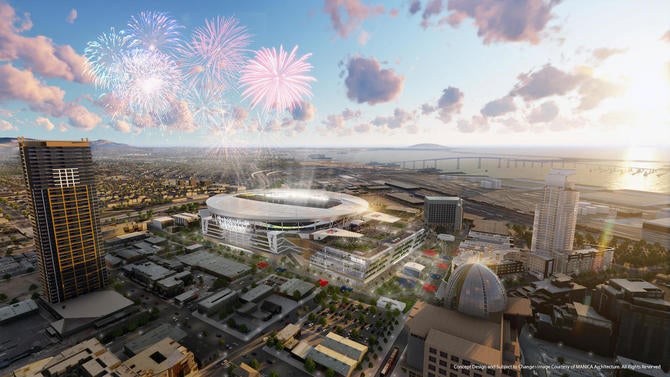When the polls open in San Diego on Tuesday, the only way funding is going to be approved for the Chargers' proposed new stadium is if the team gets the Election Day equivalent of a Hail Mary.
If the Chargers stadium initiative (Ballot Measure C) is going to pass, two-thirds of voters in San Diego need to approve it, and right now, it doesn't look like that's going to happen. A recent poll conducted by the San Diego Union-Tribune shows that only 45 percent of voters are currently in favor of passing the ballot measure.
The poll was taken between Oct. 31 and Nov. 2.
The new numbers are bad news for the Chargers because the number of supporters has actually been steadily declining over the past month. In a poll that was taken in mid-October, 48 percent of people were in favor of passing the ballot measure.
Of course, both those numbers are nowhere near the 67 percent of votes need to pass the ballot measure, and that's where things get dicey. There's a case rolling through the California Supreme Court (California Cannabis Coalition v. City of Upland) that could potentially lower the threshold for votes needed from two-thirds to a simple majority, which means the ballot would just need 50 percent plus one to pass.
Based on polling, the Chargers might be able to get that number.
Still with us?
Alright great. Here are six things to know about the Chargers stadium initiative
1. What's being voted on?
The people of San Diego are voting on a ballot measure that, if it gets passed, would raise $1.15 billion in public funding for the Chargers' new stadium. To get the money, the city would raise San Diego's hotel tax from 12.5 percent to 16.5 percent.
The proposed downtown stadium would seat 61,500 people and would cost a total of $1.8 billion. Of that total, the NFL has already promised to to put $300 million toward the project, while the Chargers would be expected to put $350 million toward the cost of the stadium. The stadium project, which has been pitched as a "convadium," would also include a convention center with a 130,000 square-foot exhibit hall. There would also be 385,000 square feet in leasable space.

The stadium itself could also be expanded to 72,000 seats in the event that San Diego is chosen to host a Super Bowl, something that NFL commissioner Roger Goodell has already promised will happen if the ballot measure passes.
2. Are there any other stadium issues on the ballot?
The most confusing part of what's happening in San Diego is that there's actually two stadium measures on the ballot. Besides Ballot Measure C, there's also Ballot Measure D, which is not endorsed by the Chargers.
This measure would give the Chargers the right to build their own stadium, but they'd have to pay for it themselves. This measure would also raise hotel taxes, but that money would be used on a new convention center only. The measure would approve the Chargers' rights to build a stadium, but ban any public money from being used to build it. It's not yet clear if this measure would need two-thirds of the vote to pass or a simple majority.
Two stadium measures! This ballot is going to confuse everyone. And you thought being a San Diegan was easy.
Anyway, moving on.
3. What happens if Ballot Measure C fails?
When it comes to this ballot measure, there's no simple explanation for anything, so let's answer this question in two parts. First, let's look at what happens if the measure fails, but gets between 50 and 66 percent of the vote.
As CBS Sports NFL Insider Jason La Canfora reported in October, the Chargers are expecting that ballot measure to fail, it's just a matter of by how much. If the measure garners more than 50 percent of the vote, that would be a big deal.
If this happens, there's a good chance the Chargers will stay in San Diego for the foreseeable future. Although the ballot would have technically failed for hitting the two-thirds mark need to pass, the Chargers would take it as a victory.
For one, they would know they have the support of more than half the people in San Diego. Plus, and this is the key part, if the California Supreme Court rules that 50 percent is good enough to pass a tax law, then the stadium measure will have passed. If the court holds off on its ruling -- meaning a two-thirds vote is still the law of the land -- you could see the Chargers file a lawsuit to try and speed things up.
That stuff will definitely take time, but it's time the Chargers should have. You've probably heard that the Chargers have to decide by Jan. 15, 2017 if they want to move in with the Rams in Los Angeles. Well, that timeline will likely get extended if the Chargers garner over 50 percent of the vote on Measure C.
When NFL owners approved the Rams move to L.A. back in January 2016, they added a small clause that would extend the Chargers' L.A. option to January 2018.
From the owners' relocation documents:
"The [Chargers] option shall expire on January 15, 2017, unless a referendum to approve public financing for a new stadium in San Diego is approved prior to November 15, 2016, in which case the Los Angeles Opportunities Committee may, at the Chargers' request, extend the option up to January 15, 2018."
Basically, if the Chargers get 50 percent or more of the vote, that means they'll likely have until January 2018 to decide if they want to move to L.A. That's a big deal for the Chargers, because if the deadline isn't extended by Jan. 15, 2017, that means they'd lose all rights to L.A. and the Raiders would then have the option to move there. (What about Vegas, you ask? Don't worry, we're getting there.)
4. What happens if Measure C fails but gets under 50 percent of the vote?
This is where things get murky. If the measure gets under 50 percent of the vote, then there's a good chance the Chargers will move. Club owner Dean Spanos would probably take that kind of outcome as a sign that San Diego doesn't want the Chargers, and he'd likely move his team to L.A. Being a co-tenant with the Rams wouldn't be ideal for the Chargers, but if San Diego doesn't want them, Spanos wouldn't have much of a choice.
5. What happens if Measure C passes?
Finally, a question with an easy answer. If Measure C passes, then the Chargers stadium will get funded and the team will stay in San Diego. Of course, it the measure passes, the politicians of San Diego will start arguing about other things, like who's going to pay for the trolley upgrade that's going to be needed at the new stadium's potential location downtown.
6. Where will the Chargers end up?
I went ahead and added some odds estimations to spice things up here.
San Diego (60 percent chance): The NFL seemingly wants the Chargers to stay in San Diego, and that's what will likely happen if the Measure C gets 50 percent or more of the vote. The Chargers might also stay if the vote total is 45 percent or above. The team's lease at Qualcomm doesn't run out until after the 2020 season, so if the Chargers do decide to stay even though the measure failed, they'd have four years to figure out new stadium terms with the city or four years to plot their next relocation.
Los Angeles (35 percent chance): If the Measure C is a total disaster and goes down in flames, Spanos will probably be on the first flight to L.A. to sign whatever papers Rams owner Stan Kroenke wants him to sign, and yes, Spanos would fly because he doesn't seem like the type of guy who would make the 120-mile drive between the two cities. Anyway, if Measure C is shot down, the only way Spanos will get a new stadium is if he moves to L.A., so he might not have a choice, even if he doesn't really want to move.
Las Vegas (4.9 percent chance): The first person to mention this possibility was Carolyn Goodman, which I'm only pointing out because she happens to be the the mayor of Las Vegas. This move might sound crazy, and the odds are low here, but it wouldn't be impossible. Vegas has already committed $750 million in funding for a new stadium, but that's contingent on getting an NFL team.
So how would the Chargers end up here? That could potentially happen if the Raiders were to get a sweet deal in Oakland. That's not likely, but it's also not impossible. The mayor of Oakland, Libby Schaaf, recently said that the city would be putting forth a "serious plan" to keep the Raiders.
NFL commissioner Roger Goodell has also said that he'd like the Raiders to stay in the Bay Area.
If the Raiders have a stadium deal in Oakland, it's unlikely that NFL owners would approve a move to Vegas for them. That would leave Vegas with $750 million for a stadium, but no NFL team. At that point, the Chargers could possibly jump in. Again, it's a long shot, but it's worth mentioning because pretty much anything is possible when a team is looking for a new stadium.
Other city (0.1 percent chance): As Raiders owner Mark Davis proved last year, a team looking for a new stadium will look anywhere. If the Chargers stadium measure is handily shot down, don't be surprised if Spanos starts using other cities as leverage.
![[object Object] Logo](https://sportshub.cbsistatic.com/i/2020/04/22/e9ceb731-8b3f-4c60-98fe-090ab66a2997/screen-shot-2020-04-22-at-11-04-56-am.png)



















